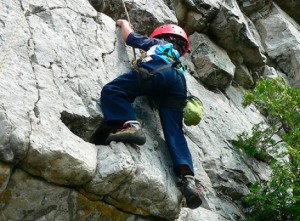 It’s easy to become overprotective of kids, especially our own. It’s as if we can suddenly see 10 steps ahead and we KNOW that something horrible is about to happen. But what if our children don’t actually need our warnings, fears, and concerns in order to keep themselves safe?
It’s easy to become overprotective of kids, especially our own. It’s as if we can suddenly see 10 steps ahead and we KNOW that something horrible is about to happen. But what if our children don’t actually need our warnings, fears, and concerns in order to keep themselves safe?
When I was in college I learned about this incredible study that was done with babies who had recently learned to crawl. They were placed on a piece of inch thick Plexiglas with a checkerboard pattern underneath. Babies crawled around easily on the surface and came to their moms who were encouraging them from the other side of the surface.

 Parents are the ultimate experts on the art of surrender. You have to be. If we didn’t surrender to the reality of our lives as parents, we’d be miserable and struggling constantly! Instead, we learn to go with the flow, relax and let go, and accept what is. Before I was pregnant I never realized how soon this process begins. But during the first few months of pregnancy when I was nauseous unless I was constantly eating protein, I realized that I was in practice mode for parenting already. I had to let go of my own desires and eat what my baby needed. And at first I felt I was forced to surrender.
Parents are the ultimate experts on the art of surrender. You have to be. If we didn’t surrender to the reality of our lives as parents, we’d be miserable and struggling constantly! Instead, we learn to go with the flow, relax and let go, and accept what is. Before I was pregnant I never realized how soon this process begins. But during the first few months of pregnancy when I was nauseous unless I was constantly eating protein, I realized that I was in practice mode for parenting already. I had to let go of my own desires and eat what my baby needed. And at first I felt I was forced to surrender. It’s easy to get into a pattern of saying things like, “Stop!”, “No!” or “Don’t do that” with kids. They’re constantly experimenting with both the physical world and with social boundaries. As a result they have a tendency to do things we don’t approve of or enjoy at least some of the time (and often a LOT of the time).
It’s easy to get into a pattern of saying things like, “Stop!”, “No!” or “Don’t do that” with kids. They’re constantly experimenting with both the physical world and with social boundaries. As a result they have a tendency to do things we don’t approve of or enjoy at least some of the time (and often a LOT of the time). If you’re noticing that your kids are having a difficult time cooperating or listening or generally following your lead, first let me remind you, you’re not alone. Lots of parents go through this difficulty every day. I know it can be super frustrating when you’re just trying to get things done, or get to the store, or follow the rules, and your child is fighting you every step of the way.
If you’re noticing that your kids are having a difficult time cooperating or listening or generally following your lead, first let me remind you, you’re not alone. Lots of parents go through this difficulty every day. I know it can be super frustrating when you’re just trying to get things done, or get to the store, or follow the rules, and your child is fighting you every step of the way. Everybody gets upset and angry sometimes and when I was young I thought that having someone near me who was angry was just about the worst thing ever. But now that I’ve grown up and gotten in touch with my own anger, I actually think there are some really great benefits of anger! You can check out my blog:
Everybody gets upset and angry sometimes and when I was young I thought that having someone near me who was angry was just about the worst thing ever. But now that I’ve grown up and gotten in touch with my own anger, I actually think there are some really great benefits of anger! You can check out my blog: